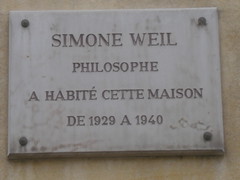

Simone Weil
(1909-1943)
Died aged c. 34
Wikidata WikipediaSimone Adolphine Weil (/ˈveɪ/ VAY, French: [simɔn vɛj]; 3 February 1909 – 24 August 1943) was a French philosopher, mystic, and political activist. Over 2,500 scholarly works have been published about her, including close analyses and readings of her work, since 1995. After her graduation from formal education, Weil became a teacher. She taught intermittently throughout the 1930s, taking several breaks due to poor health and to devote herself to political activism. Such work saw her assisting in the trade union movement, taking the side of the anarchists known as the Durruti Column in the Spanish Civil War, and spending more than a year working as a labourer, mostly in car factories, so she could better understand the working class. Taking a path that was unusual among 20th-century left-leaning intellectuals, she became more religious and inclined towards mysticism as her life progressed. Weil wrote throughout her life, although most of her writings did not attract much attention until after her death. In the 1950s and 1960s, her work became famous in continental Europe and throughout the English-speaking world. Her thought has continued to be the subject of extensive scholarship across a wide range of fields.The mathematician André Weil was her brother.
DbPedia
Commemorated on 1 plaque
Simone Weil philosophe a habité cette maison de 1929 a 1940
English translation: Simone Weil philosopher lived in this house from 1929 to 1940 [AWS Translate]
3 Rue Auguste Comte, Paris, France where they lived
